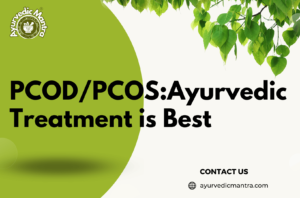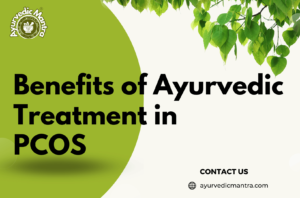
PCOD/PCOS: Ayurvedic Treatment is Best
Introduction Polycystic Ovary Disorder (PCOD) or Polycystic Ovary Syndrome (PCOS) is a common endocrine disorder affecting millions of women worldwide. It leads to hormonal imbalances,


Polycystic Ovary Syndrome (PCOD) is a common hormonal disorder that affects many women worldwide. Living with PCOD can present various challenges, but managing the condition and effectively leading a fulfilling life is possible with the right approach and lifestyle changes. This comprehensive guide will explore the critical aspects of PCOD management and provide valuable tips to help you navigate this journey.
PCOD is a hormonal disorder characterized by the growth of small cysts on the ovaries. This can lead to irregular menstrual cycles, excessive androgen (male hormones) production, and a range of symptoms such as acne, weight gain, and hair thinning. While the exact cause of PCOD is not fully understood, genetics and insulin resistance are believed to play a significant role.
Maintaining a balanced and nutritious diet is essential for managing PCOD. Focus on whole foods, including fruits, vegetables, lean proteins, whole grains, and healthy fats. Incorporate foods with a low glycemic index to help regulate blood sugar levels and insulin resistance. Avoid highly processed and sugary foods, as they can exacerbate PCOD symptoms.
Engaging in regular physical activity has numerous benefits for women with PCOD. Exercise helps improve insulin sensitivity, manage weight, and reduce stress. Aim for cardiovascular conditioning, strength training, and flexibility exercises. Consult with a healthcare professional before starting a new exercise routine.
Chronic stress can worsen PCOD symptoms by affecting hormone levels. Practicing stress-reduction techniques such as yoga, meditation, deep breathing, and mindfulness can positively impact your overall well-being and PCOD management.
Getting enough quality sleep is crucial for hormonal balance and overall health. Create a sleep-friendly environment, establish a consistent sleep schedule, and prioritize 7-9 hours of restful sleep each night.
Sometimes, healthcare providers may recommend medication to regulate menstrual cycles, reduce androgen levels, and manage other PCOD-related symptoms. It’s important to follow your doctor’s guidance and attend regular check-ups.
Frequent visits to your healthcare provider are essential for monitoring your PCOD and overall health. Routine check-ups, blood tests, and ultrasounds can help track your progress and make necessary adjustments to your management plan.
Maintaining a healthy weight is beneficial for PCOD management. Even a modest weight loss of 5-10% can significantly improve symptoms. Focus on sustainable lifestyle changes rather than extreme diets.
Balancing hormone levels is a crucial aspect of PCOD management. Your healthcare provider may recommend hormonal birth control to regulate periods and manage androgen-related symptoms.
PCOD can affect fertility, but many women with the condition have successful pregnancies. If you plan to conceive, work closely with a healthcare provider to optimize your fertility and ensure a healthy pregnancy.
Living with PCOD can be emotionally challenging. Seek support from friends, family, or a therapist who can provide guidance and understanding. Connecting with support groups or online communities can also offer a sense of belonging and valuable insights.
Managing PCOD requires a holistic approach encompassing lifestyle changes, medical guidance, and emotional well-being. By prioritizing a healthy diet, regular exercise, stress management, and seeking appropriate medical care, you can effectively manage PCOD and improve your quality of life. Remember that every individual’s journey is unique, so tailor your management plan to suit your specific needs and goals. Living well with PCOD is within reach with determination and the right strategies.
A1: PCOD, or Polycystic Ovary Syndrome, is a hormonal disorder characterized by small cysts on the ovaries. It can lead to irregular menstrual cycles, excessive androgen production, and a range of symptoms such as acne, weight gain, and hair thinning. PCOD can impact fertility and overall well-being if not appropriately managed.
A2: Yes, PCOD is a relatively common condition affecting many women, especially those of reproductive age. While the exact cause is not fully understood, genetics and insulin resistance are believed to contribute. Women with a family history of PCOD, obesity, and insulin resistance are at a higher risk.
A3: Diet plays a crucial role in PCOD management. Opting for a balanced diet rich in whole foods, such as fruits, vegetables, lean proteins, and whole grains, can help regulate blood sugar levels and insulin resistance. Avoiding processed and sugary foods is recommended to mitigate PCOD symptoms.
A4: Yes, regular exercise is beneficial for PCOD management. Combining cardiovascular conditioning, strength training, and flexibility activities can improve insulin sensitivity, aid in weight management, and reduce stress. Consult with a healthcare professional to determine the most suitable exercise routine.
A5: Stress management is essential for PCOD management. Techniques such as yoga, meditation, deep breathing, mindfulness, and engaging in hobbies can help reduce stress and improve overall well-being. Finding activities that promote relaxation and a sense of calm can be highly beneficial.
A6: Sometimes, lifestyle modifications alone can effectively manage PCOD symptoms. However, healthcare providers may prescribe medications to regulate menstrual cycles, reduce androgen levels, and address specific symptoms. Working closely with a healthcare professional to determine the best approach for your needs is essential.
A7: Maintaining a healthy weight is essential for PCOD management. Even a modest weight loss of 5-10% can significantly improve symptoms and hormonal balance. Excess weight can contribute to insulin resistance, exacerbating PCOD symptoms, so adopting a healthy lifestyle and achieving a healthy weight can have positive effects.
A8: PCOD can impact fertility due to irregular ovulation. However, many women with PCOD conceive successfully with medical intervention and lifestyle changes. If planning to create, consulting with a healthcare provider is crucial to optimize fertility and ensure a healthy pregnancy.
A9: While lifestyle changes are essential, some natural remedies like herbal supplements, acupuncture, and certain dietary supplements have been explored for PCOD management. However, consulting with a healthcare professional before incorporating natural remedies is essential to ensure safety and effectiveness.
A10: Emotional support is vital for managing PCOD, as the condition can impact mental well-being. Seeking help from friends, family, or a therapist can provide guidance and coping strategies. Connecting with support groups or online communities allows individuals to share experiences, gain insights, and find a sense of belonging.
A11: PCOD is a chronic condition that doesn’t have a definitive cure. However, with effective management strategies, the symptoms can be controlled, and women with PCOD can lead healthy and fulfilling lives. Continuous lifestyle adjustments, medical guidance, and self-care are essential for long-term PCOD management.
A12: If left unmanaged, PCOD can lead to various complications, including infertility, type 2 diabetes, cardiovascular diseases, and endometrial cancer. Proper management can significantly reduce the risk of these complications and improve overall health outcomes.
A13: The timeline for improvements in PCOD symptoms varies from person to person. Consistent adherence to lifestyle changes, some individuals may experience positive changes within a few months. However, it’s essential to be patient and continue with the recommended strategies for long-term benefits.
A14: Achieving a regular menstrual cycle is possible with proper PCOD management. Lifestyle changes, medication, and hormonal therapies can help regulate menstrual cycles and improve hormonal balance, leading to more predictable periods.
A15: While there is no foolproof way to prevent PCOD, adopting a healthy lifestyle from a young age, maintaining a balanced diet, staying physically active, and managing stress can reduce the risk of developing PCOD or lessen the severity of symptoms.
A16: Collaborating with healthcare professionals is essential for effective PCOD management. Regular visits to your healthcare provider, open communication, following recommended treatments, and seeking guidance on lifestyle modifications can help you better control your PCOD and overall well-being.

Introduction Polycystic Ovary Disorder (PCOD) or Polycystic Ovary Syndrome (PCOS) is a common endocrine disorder affecting millions of women worldwide. It leads to hormonal imbalances,

Introduction Losing weight is a journey that requires dedication, consistency, and self-care. While there are numerous weight loss techniques out there, not all of them

Polycystic Ovary Syndrome (PCOS) is a hormonal disorder that affects millions of women worldwide. It can lead to various health complications, such as irregular periods,

In recent years, Ayurveda, an ancient system of natural healing originating from India, has gained significant popularity as an alternative approach to treating various health

आजकल वजन बढ़ने और चर्बी की वृद्धि होने की समस्या एक आम समस्या बन गई है। बढ़ते वजन और अतिरिक्त चर्बी के कारण न केवल

प्रस्तावना: आजकल वजन बढ़ने और ओबेसिटी की समस्या एक आम समस्या बन गई है। बढ़ते वजन के कारण न केवल शारीरिक समस्याएं होती हैं, बल्कि
